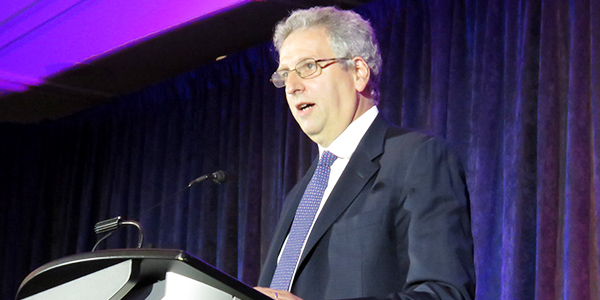By Rich Heidorn Jr.
WASHINGTON — Nearing the end of his rookie year, FERC Commissioner Richard Glick last week reiterated his opposition to the Trump administration’s efforts to protect coal and nuclear generation, rejecting the notion that national security is at stake.
The luncheon speaker for the second day of the Energy Bar Association’s Mid-Year Energy Forum, Glick opened his address with wishes for a “speedy recovery” for Commissioner Kevin McIntyre, who stepped down from the chairmanship Oct. 24 after disclosing a “serious setback” in his battle with a brain tumor. McIntyre last appeared in public at the commission’s July meeting. “We hope he’s back at 888 First St. [FERC headquarters] as soon as possible,” Glick said.
After that, Glick reflected on his first 11 months in office and the “resilience” debate sparked by the Department of Energy’s proposals to deliver on Trump’s campaign promise to save the coal industry. Last month, the administration reportedly dropped DOE’s proposal to invoke emergency powers to provide price supports for “fuel secure” generation following opposition from the National Security Council and National Economic Council. (See Chatterjee Dodges as DOE Spins on Coal Bailout.)
“Fortunately, at least according to press reports, that particular approach may be waning,” Glick said. “It’s hard to tell … we still hear from the secretary of energy … and others in the Department of Energy — suggesting that we have a national security emergency. The concern I have — and both parties do this — people overuse the term ‘national security.’”
Glick, a Democrat, agreed that policymakers “should be prepared for low-frequency, high-impact events” such as extreme storms and cyberattacks. “This isn’t a new issue … [NERC has] been looking at this issue for a number of years. They haven’t always been calling it ‘resilience.’”
If gas pipelines are at risk from cyberattacks, “let’s try to figure out how to solve the cybersecurity problem,” he said. “We should figure that out, not try to figure out some other solution that seems to be aimed elsewhere. And I think everyone recognizes if we do have issues with blackouts … the issues are mostly going to be in transmission and distribution, not necessarily generation.”
The commissioner rejected the argument that the Supreme Court’s 1944 Federal Power Commission v. Hope Natural Gas Co. ruling ensures generation owners will not lose money on their investments. “I don’t think that’s what Hope said, especially in a competitive market. … Not everyone can make money. There’s going to be some companies that do well, and some aren’t.”
Glick also noted the commission’s April order making it easier for renewables to interconnect with the grid (RM17-8) and said he hoped it will act soon on an order to encourage aggregation of distributed energy resources in wholesale markets. “I think that has the potential to be a big boon, both for reliability but also for those technologies and certainly for green energy,” he said. (See Ready to Act on DERs, FERC Tells Congress.)





